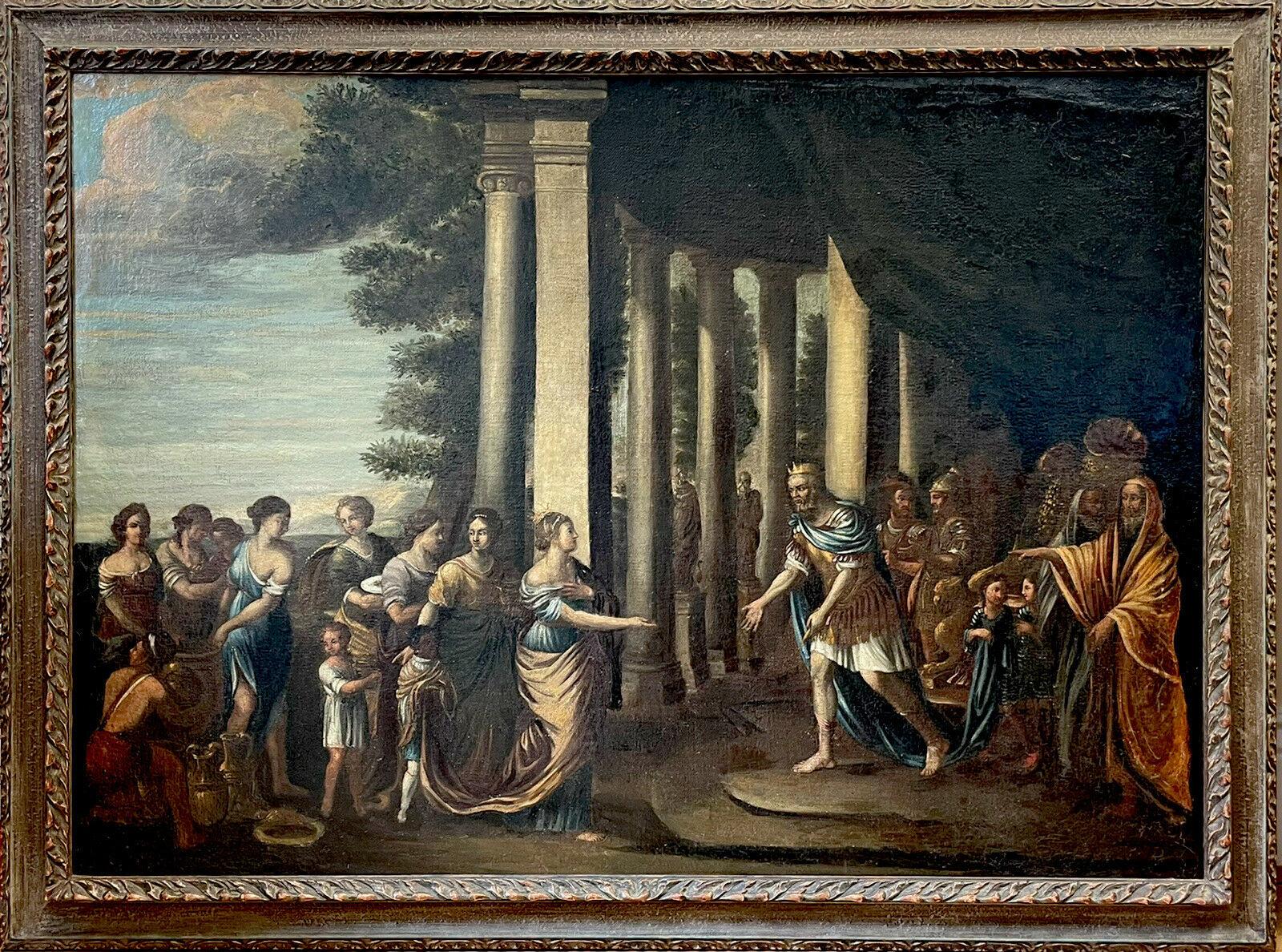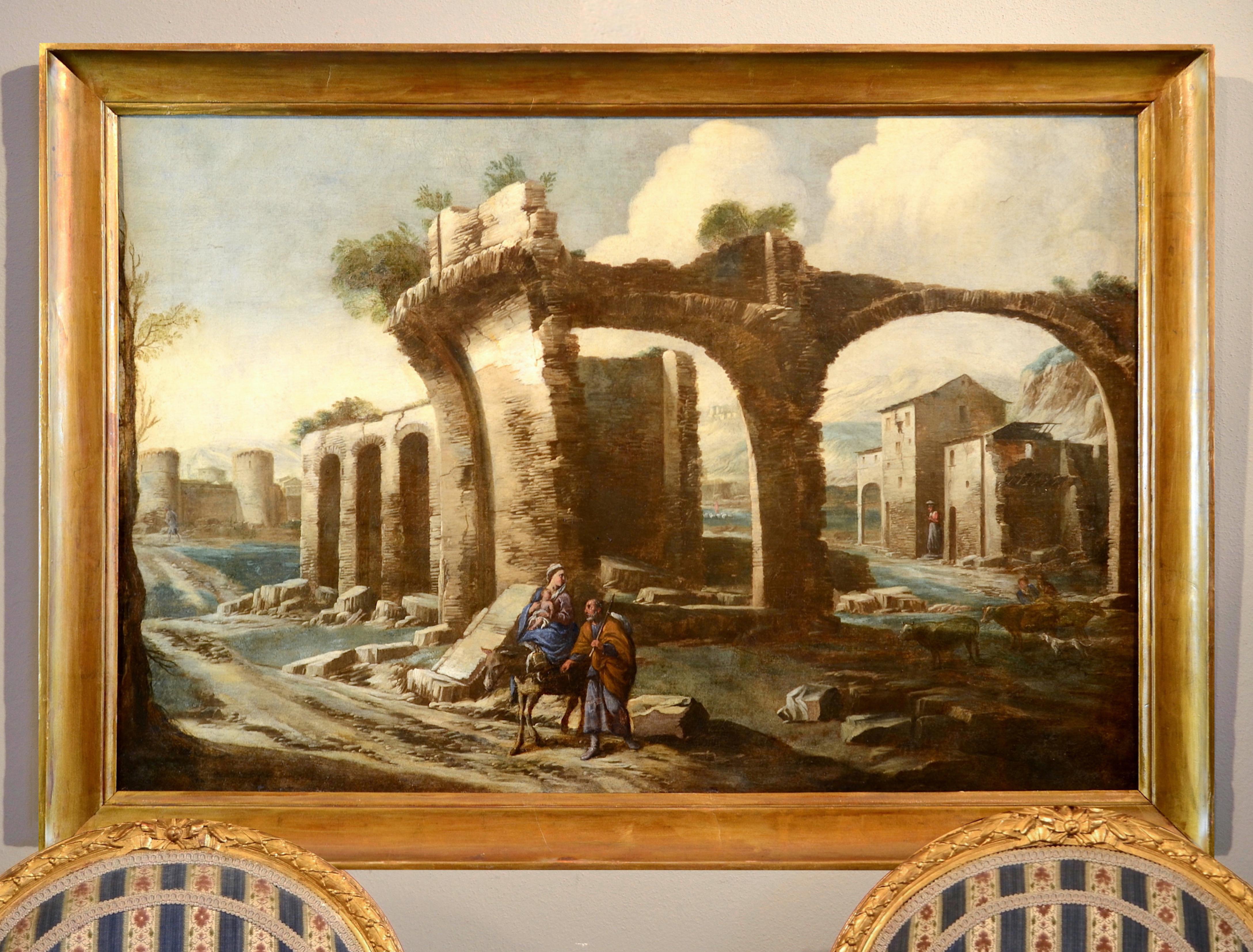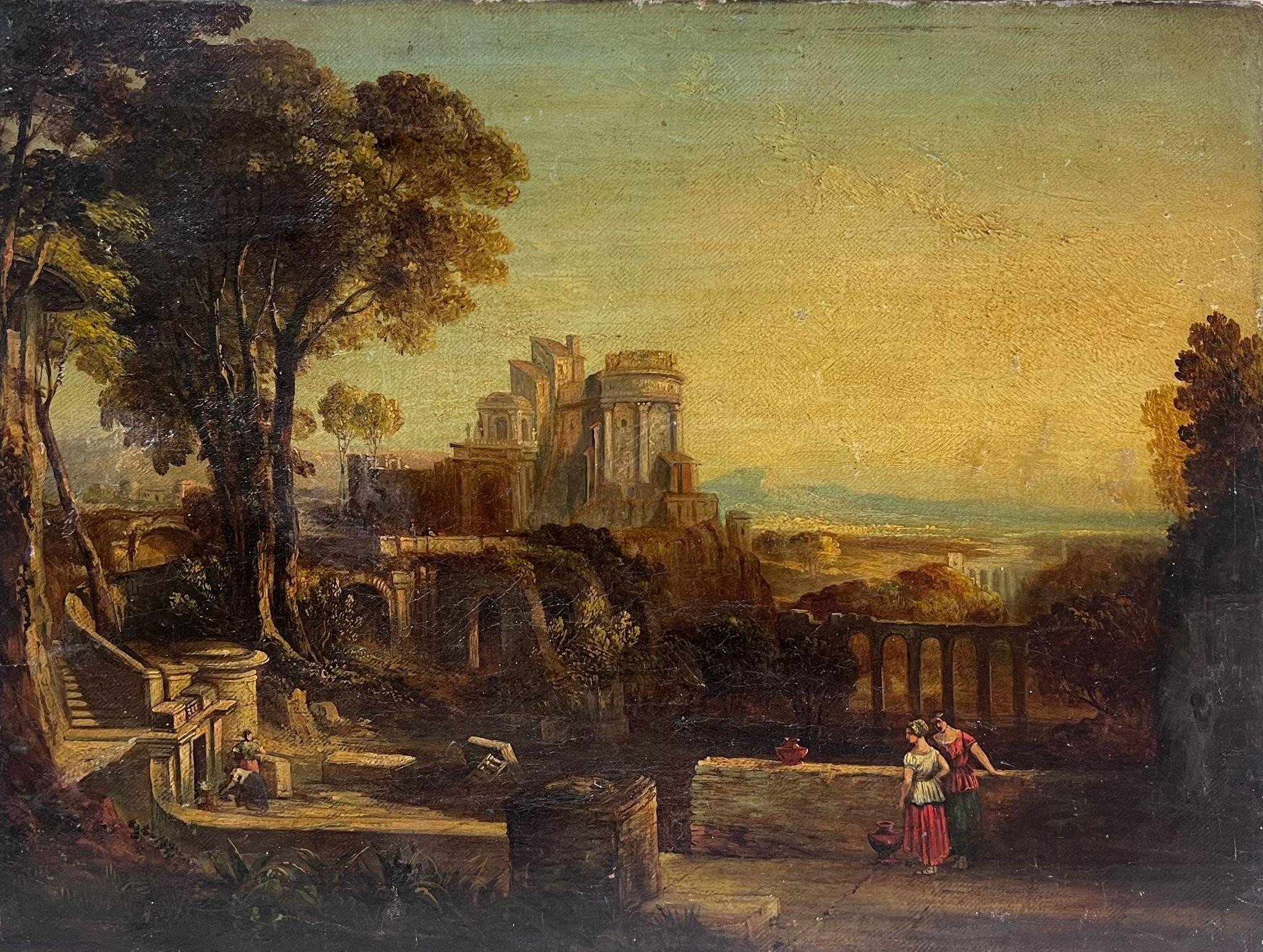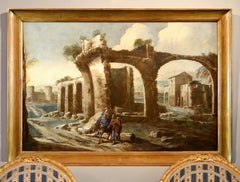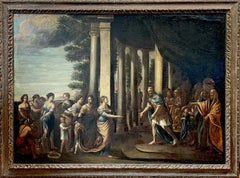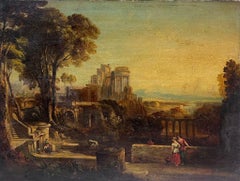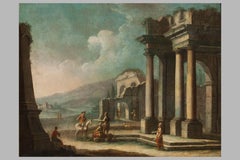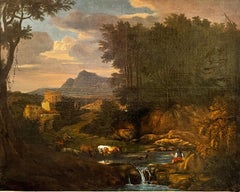Items Similar to Ghisolfi Portrait Old master Oil on canvas17th Century Architecture Italy Art
Want more images or videos?
Request additional images or videos from the seller
1 of 15
Ghisolfi Portrait Old master Oil on canvas17th Century Architecture Italy Art1650-1699
1650-1699
$5,835.15
$11,670.3050% Off
£4,329.36
£8,658.7250% Off
€4,875
€9,75050% Off
CA$8,135.16
CA$16,270.3350% Off
A$8,820.19
A$17,640.3950% Off
CHF 4,648.22
CHF 9,296.4550% Off
MX$107,262.15
MX$214,524.3150% Off
NOK 57,831.28
NOK 115,662.5650% Off
SEK 54,689
SEK 109,37850% Off
DKK 37,122.50
DKK 74,245.0150% Off
About the Item
Giovani Ghisolfi (Milan 1623-1683), attributed / workshop
View of classical architectural ruins with Pythagoras pretending to return from Hades
Oil on canvas, cm. 70 x 84
In frame cm. 86 x 100
The painting in question, depicting an architectural glimpse with classical ruins, is attributable to the work of the Milanese painter Giovanni Ghisolfi and takes up the work that the painter created for the renowned collection of Cardinal Pietro Ottoboni, great-grandson of Pope Alexander VIII, who later passed to Roman collection Almagià
In the left area you can see the ruins of an ancient temple, which evoke that of Saturn in the Roman Forum, while the animated scene in the foreground is a fascinating representation of the Greek philosopher Pythagoras as he comes out of the cave he built himself, where he decided to retire to meditate and study philosophy, then telling his followers who were awaiting his return that he had reached Hades and was therefore resurrected.
The scenery is flooded with a gloomy light to evoke the late evening, where the rays that stand out on the pillars and boulders have an evocative, metaphysical effect, and with the clouds on the horizon that give brighter colors.
The painting is a good testimony of Ghisolfi's classicist 'ruinism', and in particular of his mature phase, characterized by constructions orchestrated with measured and skilful balance. This is the softer and freer pictorial style of the Lombard-born painter, who owes much to the influence of Salvator Rosa, with whom he was a close friend during his stay in Rome in the 1950s.
Ghisolfi was a forerunner compared to many artists of the following century who drew fruitful ideas from this last phase of the Milanese master by birth but Roman by adoption. Precisely in the papal city he matured his training in these particular iconographies, centered on the ancient Roman remains, and thanks to which he became the most successful specialist in this vein.
Upon examination of the Wood lamp, minor restoration interventions are highlighted, but overall the state of conservation is excellent.
Complete painting with certificate of authenticity in accordance with the law.
For any information, do not hesitate to contact us.
- Attributed to:Giovani Ghisolfi (Milan 1623-1683) (1623 - 1683, Italian)
- Creation Year:1650-1699
- Dimensions:Height: 33.86 in (86 cm)Width: 39.38 in (100 cm)
- Medium:
- Movement & Style:
- Period:
- Condition:
- Gallery Location:Riva del Garda, IT
- Reference Number:1stDibs: LU98817981662
About the Seller
4.9
Platinum Seller
Premium sellers with a 4.7+ rating and 24-hour response times
Established in 2017
1stDibs seller since 2018
260 sales on 1stDibs
Typical response time: 1 hour
- ShippingRetrieving quote...Shipping from: Riva del Garda, Italy
- Return Policy
Authenticity Guarantee
In the unlikely event there’s an issue with an item’s authenticity, contact us within 1 year for a full refund. DetailsMoney-Back Guarantee
If your item is not as described, is damaged in transit, or does not arrive, contact us within 7 days for a full refund. Details24-Hour Cancellation
You have a 24-hour grace period in which to reconsider your purchase, with no questions asked.Vetted Professional Sellers
Our world-class sellers must adhere to strict standards for service and quality, maintaining the integrity of our listings.Price-Match Guarantee
If you find that a seller listed the same item for a lower price elsewhere, we’ll match it.Trusted Global Delivery
Our best-in-class carrier network provides specialized shipping options worldwide, including custom delivery.More From This Seller
View AllGhisolfi Paint Oil on canvas Old master 17th Century Architectural Capriccio Art
By Giovanni Ghisolfi (Milan 1623 - 1683)
Located in Riva del Garda, IT
Giovanni Ghisolfi
(Milan 1623 - 1683)
Architectural capriccio with ruins of an Ionic temple
Oil painting on canvas
73 x 87 cm.,
within a gilded wooden frame 87 x 100 cm.
This quali...
Category
17th Century Old Masters Paintings
Materials
Oil
$8,591 Sale Price
35% Off
Landscape Paint Oil on canvas Italy 17th Century Quality Old master Holy family
By Antonio Travi
Located in Riva del Garda, IT
Antonio Travi, called Sestri
(Genoa, Sestri Ponente 1608 - Genoa 1665)
Landscape with ruins and biblical scene
First half of the seventeenth century
oil on canvas, 82 x 121 cm
The beautiful painting published, which presents a vast landscape with architectural ruins, fully reflects the pictorial poetics of Antonio Travi (Sestri Ponente 1608 - Genoa 1665), the first landscape painter of the Genoese pictorial school; A poetic that remains constant throughout his career: Bernardo Strozzi...
Category
17th Century Old Masters Paintings
Materials
Oil
Saint John the Baptist Paint Pasinelli 17th Century Oil on canvas Old master
Located in Riva del Garda, IT
Lorenzo Pasinelli (Bologna, 1629 - 1700)
Sermon of Saint John the Baptist Circa 1650.
Oil on canvas 115 x 154 cm With frame 136 x 174 cm
Provenance Milan, Porro 6 June 2006 ...
Category
17th Century Old Masters Paintings
Materials
Oil
$24,778 Sale Price
20% Off
Landscape Paint Oil on canvas 18th Century Old master Roma Italy River Water Art
By Paolo Anesi (Rome 1697 - 1773)
Located in Riva del Garda, IT
Roman landscape painter of the eighteenth century - Entourage by Paolo Anesi (Rome 1697 - 1773)
River landscape of the Lazio countryside, with the Tiber fl...
Category
18th Century Old Masters Paintings
Materials
Oil
$6,037 Sale Price
20% Off
Knight Van Douw Paint Oil on canvas Old master 17/18th Century Flemish Art Italy
By Simon Johannes van Douw (Antwerp c. 1630 - c. 1677)
Located in Riva del Garda, IT
After Simon Johannes van Douw (Antwerp c. 1630 - c. 1677)
The stop of a traveler on horseback near a post station
Oil painting on canvas
45 x 55 cm
In frame cm. 55 x 65
In this pleasant painting, depicting a knight parked near a post station, the Flemish tradition is based on a strong Italianizing sensitivity, especially by observing the setting and its peculiar brightness.
The mixture of genres and the particular style of execution make it easy to trace the authorship back to a Nordic author but active in Rome, or strongly influenced by the style in vogue in the Eternal city, between the seventeenth and eighteenth centuries: we are referring, in in particular, to a follower of the Antwerp Simon Johannes van Douw.
The chromatic elegance and refinement with which he outlines the figures are typical aspects of his painting.
The scene takes place outside a cottage, probably a post office for travelers, where a modest family divides the tasks by assisting the knights. We see a young boy who hands water to the horse before he sets off again, the father is preparing to feed him with straw and the mother who instead takes care of the little son.
The Italian reminiscences, evident in our painting, have been absorbed by many Northern European authors such as Nicolaes Berchem, Philips Wouwerman or Johannes Lingelbach, all inspired by the leader Pieter van Laer...
Category
18th Century Old Masters Paintings
Materials
Oil
$4,233 Sale Price
20% Off
Toby Angel Savoldo Religious 17/18th Century Paint Oil on canvas Old master
Located in Riva del Garda, IT
Giovanni Gerolamo Savoldo (Brescia, c. 1480 – after 1548) Follower of
Toby and the Angel
Oil on canvas 63 x 76 cm - In frame 77 x 90 cm
We are pleased to offer this valuable ...
Category
17th Century Old Masters Paintings
Materials
Oil
$6,848 Sale Price
20% Off
You May Also Like
HUGE 17thC ITALIAN OLD MASTER OIL PAINTING - KING & COURT FIGURES ROMAN BUILDING
Located in Cirencester, Gloucestershire
Artist/ School: Italian School, 17th century.
Title: A King and Queen before court figures, amidst a classical landscape with Roman columns.
Medium: oil painting on canvas, framed
...
Category
17th Century Old Masters Figurative Paintings
Materials
Canvas, Oil
Fine 1800's Italian Grand Tour Oil Painting Figures before Classical Buildings
Located in Cirencester, Gloucestershire
The Arcadian View
Italian School, circa 1800
Grand Tour subject
oil on canvas, unframed
canvas : 12 x 16 inches
provenance: private collection, UK
condition: very good and sound cond...
Category
Early 1800s Old Masters Landscape Paintings
Materials
Oil
$2,414 Sale Price
20% Off
18th Century By Giovanni Domenico Gambone Pair of Capricci Oil on Canvas
Located in Milano, Lombardia
Giovanni Domenico Gambone (1720 - 1793)
Title: Pair of Capricci
Medium: Oil on canvas
Dimensions: without frame 85 x 112 cm - with frame 97 x 124 cm
The price is intended for the c...
Category
Mid-18th Century Old Masters Landscape Paintings
Materials
Oil, Canvas
Huge 18th Century Italian Old Master Oil Painting Figures & Animals Arcadian
Located in Cirencester, Gloucestershire
The Arcadian Landscape
Italian School, 18th century
oil painting on canvas, unframed
canvas size: 32 x 40 inches
condition: excellent condition for its age, fully restored.
provenance: from a private collection in Paris, France.
Large scale classical 18th century Italian Old Master...
Category
Early 18th Century Old Masters Landscape Paintings
Materials
Canvas, Oil
Italian Old Master Painting, 17th Century, Oil on Canvas
Located in Aalsgaarde, DK
Italian old master painting, 17th century, oil on canvas. Good condition
Measures: H. 54 W. 43 cm
H. 21.2 W. 16.9 in.
Category
Antique 17th Century Italian Paintings
Materials
Paint
Italian Early 18th Century Roman Oil on Canvas, of an Architectural Theme
Located in West Palm Beach, FL
A very attractive Italian early 18th Century Roman oil on canvas, of an architectural theme. The painting is of a central round pavilion amidst ruins accente...
Category
Antique 18th Century Italian Paintings
Materials
Canvas, Giltwood
More Ways To Browse
Antique Law
Old Master Painting Italian
Antique Forum
Classical Ruins
Roman Forum
Greek Philosophers
Italian Architecture Painting
Milan Italy Painting
Oil Architecture Italian
Spanish Impressionist Painting
19th Century Painting Of Castle
Oil Painting Snow And Mountains
Provence Oil Painting
Vintage Painting Of European Cities
19th Century Oil Painting Of Women
Ile De France
Large Flowers Art
Vincent Van Gogh Oil Painting
